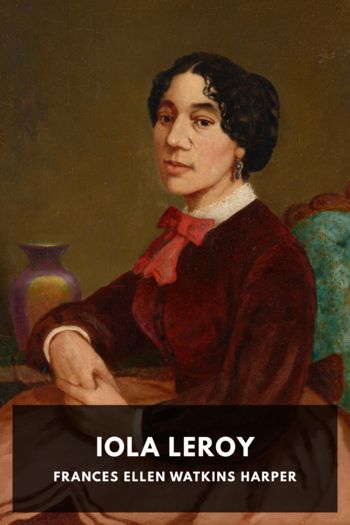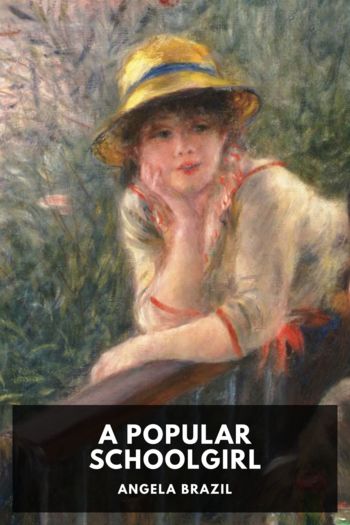Iola Leroy, Frances Ellen Watkins Harper [read aloud books .txt] 📗

- Author: Frances Ellen Watkins Harper
Book online «Iola Leroy, Frances Ellen Watkins Harper [read aloud books .txt] 📗». Author Frances Ellen Watkins Harper
Harry at once telegraphed the glad tidings to his mother, who waited their coming with joyful anticipation. Long before the cars reached the city, Mrs. Leroy was at the depot, restlessly walking the platform or eagerly peering into the darkness to catch the first glimpse of the train which was bearing her treasures.
At length the cars arrived, and, as Harry and Iola alighted, Marie rushed forward, clasped Iola in her arms and sobbed out her joy in broken words.
Very happy was the little family that sat together around the supper-table for the first time for years. They partook of that supper with thankful hearts and with eyes overflowing with tears of joy. Very touching were the prayers the mother uttered, when she knelt with her children that night to return thanks for their happy reunion, and to seek protection through the slumbers of the night.
The next morning, as they sat at the breakfast-table, Marie said:
“My dear child, you are so changed I do not think I would have known you if I had met you in the street!”
“And I,” said Harry, “can hardly realize that you are our own Iola, whom I recognized as sister a half dozen years ago.”
“Am I so changed?” asked Iola, as a faint sigh escaped her lips.
“Why, Iola,” said Harry, “you used to be the most harum-scarum girl I ever knew, laughing, dancing, and singing from morning until night.”
“Yes, I remember,” said Iola. “It all comes back to me like a dream. Oh, mamma! I have passed through a fiery ordeal of suffering since then. But it is useless,” and as she continued her face assumed a brighter look, “to brood over the past. Let us be happy in the present. Let me tell you something which will please you. Do you remember telling me about your mother and brother?”
“Yes,” said Marie, in a questioning tone.
“Well,” continued Iola, with eyes full of gladness, “I think I have found them.”
“Can it be possible!” exclaimed Marie, in astonishment. “It is more than thirty years since we parted. I fear you are mistaken.”
“No, mamma; I have drawn my conclusions from good circumstantial evidence. After I was taken from you, I passed through a fearful siege of suffering, which would only harrow up your soul to hear. I often shudder at the remembrance. The last man in whose clutches I found myself was mean, brutal, and cruel. I was in his power when the Union army came into C⸺, where I was living. A number of colored men stampeded to the Union ranks, with a gentleman as a leader, whom I think is your brother. A friend of his reported my case to the commander of the post, who instantly gave orders for my release. A place was given me as nurse in the hospital. I attended that friend in his last illness. Poor fellow! he was the best friend I had in all the time I have been tossing about. The gentleman whom I think is your brother appeared to be very anxious about his friend’s recovery, and was deeply affected by his death. In one of the last terrible battles of the war, that of Five Forks, he was wounded and put into the hospital ward where I was an attendant. For awhile he was delirious, and in his delirium he would sometimes think that I was his mother and at other times his sister. I humored his fancies, would often sing to him when he was restless, and my voice almost invariably soothed him to sleep. One day I sang to him that old hymn we used to sing on the plantation:—
“Drooping souls no longer grieve,
Heaven is propitious;
If on Christ you do believe,
You will find Him precious.”
“I remember,” said Marie, with a sigh, as memories of the past swept over her.
“After I had finished the hymn,” continued Iola, “he looked earnestly and inquiringly into my face, and asked, ‘Where did you learn that hymn? I have heard my mother sing it when I was a boy, but I have never heard it since.’ I think, mamma, the words, ‘I was lost but now I’m found; glory! glory! glory!’ had imprinted themselves on his memory, and that his mind was assuming a higher state of intellectuality. He asked me to sing it again, which I did, until he fell asleep. Then I noticed a marked resemblance between him and Harry, and I thought, ‘Suppose he should prove to be your long-lost brother?’ During his convalescence we found that we had a common ground of sympathy. We were anxious to be reunited to our severed relations. We had both been separated from our mothers. He told me of his little sister, with whom he used to play. She had a mole on her cheek which he called her beauty spot. He had the red spot on his forehead which you told me of.”
XXIII Delightful ReunionsVery bright and happy was the home where Marie and her children were gathered under one roof. Mrs. Leroy’s neighbors said she looked ten years younger. Into that peaceful home came no fearful forebodings of cruel separations. Harry and Iola were passionately devoted to their mother, and did all they could to flood her life with sunshine.
“Iola, dear,” said Harry, one morning at the breakfast-table, “I have a new pleasure in store for you.”
“What is it, brother mine?” asked Iola, assuming an air of interest.
“There is a young lady living in this city to whom I wish to introduce you. She is one of the most remarkable women I have ever met.”
“Do tell me all about her,” said Iola. “Is she young and handsome, brilliant and witty?”
“She,” replied Harry,





Comments (0)